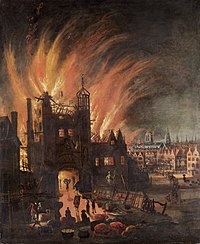A poem by John Dryden.
Dryden's 'Annus Mirabilis: the year of wonders, 1666; an historical poem'
Wikipedia
This text was copied from Wikipedia on 14 April 2024 at 5:11AM.

Annus Mirabilis is a poem written by John Dryden published in 1667. It commemorated 1665–1666, the "year of miracles" of London. Despite the poem's name, the year had been one of great tragedy, including the Great Fire of London. The title was perhaps meant to suggest that the events of the year could have been worse. Dryden wrote the poem while at Charlton in Wiltshire, where he went to escape one of the great events of the year: the Great Plague of London.[1]
Historical context
The title of Dryden's poem, used without capitalisation, annus mirabilis, derives its meaning from its Latin origins and describes a year of particularly notable events. According to the Oxford English Dictionary, Dryden's use of the term for the title of his poem constitutes the first known written use of the phrase in an English text.[2] The first event of the miraculous year was the Battle of Lowestoft fought by English and Dutch ships in 1665. The second was the Four Days Battle of June 1666, and finally the victory of the St. James's Day Battle a month later. The second part of the poem deals with the Great Fire of London that ran from September 2–7, 1666. The miracle of the Fire was that London was saved, that the fire was stopped, and that the great king (Charles II) would rebuild, for he already announced his plans to improve the streets of London and to begin great projects. Dryden's view is that these disasters were all averted, that God had saved England from destruction, and that God had performed miracles for England.
Structure
The poem contains 1216 lines of verse, arranged in 304 quatrains. Each line consists of ten syllables, and each quatrain follows an abab rhyme scheme, a pattern referred to as a decasyllabic quatrain. Rather than write in the heroic couplets found in his earlier works, Dryden used the decasyllabic quatrain exemplified in Sir John Davies' poem Nosce Teipsum in 1599. The style was revived by William Davenant in his poem Gondibert, which was published in 1651 and influenced Dryden's composition of Annus Mirabilis.[3] This particular style dictates that each quatrain should contain a full stop, which A. W. Ward believes causes the verse to become "prosy".[3]
References
- ^ Johnson, Samuel. "Johnson on Annus Mirabilis" Annus Mirabilis. John Dryden and William Dougal Christie. Clarendon Press (1915) p.xi-xii.
- ^ Oxford English Dictionary "Annus Mirabilis".
- ^ a b Ward, A. W., The Cambridge History of English and American Literature. "Dryden: Annus Mirabilis". Volume 8: The Age of Dryden. [1]
External links

Log in to post an annotation.
If you don't have an account, then register here.
References
Chart showing the number of references in each month of the diary’s entries.
1667
- Feb
4 Annotations
First Reading
CGS • Link
To read
use ctrl f to find
& ANNUS MIRABILIS
THE YEAR OF WONDERS, 1666.
AN HISTORICAL POEM.
* * * * *
AN ACCOUNT OF THE ENSUING POEM, IN A LETTER TO THE HONOURABLE SIR ROBERT
HOWARD.
Sir,--I am so many ways obliged to you, and so little able to return
your favours, that, like those who owe too much, I can only live by
getting further into your debt..
.....
http://www.gutenberg.org/files/11…
Annus Mirabilis (poem)
for notes
http://en.wikipedia.org/wiki/Annu… saw the dortoire —[dormitory]—
Michael Robinson • Link
Dryden, John, 1631-1700.
Annus mirabilis: the year of wonders, 1666. An historical poem: containing the progress and various successes of our naval war with Holland, under the conduct of His Highness Prince Rupert, and His Grace the Duke of Albemarl. And describing the fire of London· By John Dryden, Esq;
London : printed for Henry Herringman, at the Anchor in the lower walk of the New Exchange, 1667.
8vo., [24], 77, [1] p. ;
Wing (CD-ROM, 1996), D2238; Macdonald, H. Dryden, 9ai-iii; Pforzheimer, 316
No separate edition survives in the PL.
Three separate editions 1667, 1668, 1668 before appearing in vol iv of Tonson's edition of 'The Works ...' 1693.
Second Reading
Terry Foreman • Link
John Dryden (1631–1700). The Poems of John Dryden. 1913.
Annus Mirabilis:
The Year of Wonders, 1666.
An Historical Poem
TO THE
METROPOLIS
OF
GREAT BRITAIN
The most renowned and late flourishing
City of London,
in its
REPRESENTATIVES
The LORD MAYOR and Court of ALDERMEN,
the SHERIFFS and COMMON COUNCIL of it.
http://www.bartleby.com/204/5.html
Terry Foreman • Link
Annus mirabilis, The year of wonders, 1666 an historical poem containing the progress and various successes of our naval war with Holland, under the conduct of His Highness Prince Rupert, and His Grace the Duke of Albemarl : and describing the fire of London / by John Dryden, Esq.
Dryden, John, 1631-1700.
London: Printed for Henry Herringman ..., 1667.
Early English Books Online [full text]
http://quod.lib.umich.edu/e/eebo/…